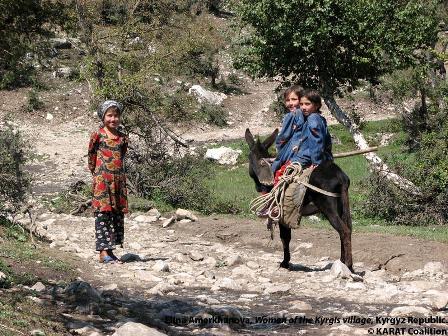Do you know that:
- In Azerbaijan more than 35% of women declared that they were abused at homes by their husbands or husbands’ relatives but a number of reported cases on domestic violence is extremely low compared with a huge number of abused women who remain the silent victims.
- Every year hundreds of young Kyrgyz women are kidnapped and forced to get married to the complete strangers in most cases. Thousands of women suffer in silence not daring to object to the custom of bride kidnapping.
- Every year hundreds of Polish women are denied their right to decide whether to give birth to an incurably sick or conceived in a result of rape child. However, almost none of them seek justice on the grounds of rights’ violations guaranteed by Polish law.
- In Tajikistan “wife beating” is a widely spread phenomenon and every year over 2,500 women – victims of domestic violence seek help in Crisis Centers. However, these women are exceptions as the majority of oppressed wives and daughters-in-law seek neither militia’s nor social services’ help.
- Every year hundreds of women and girls from Uzbekistan fall victims of trafficking, specifically for the purpose of sexual exploitation although the state has adopted the counter-trafficking legislation.
Why the women in these countries suffer despite that the national and international law guarantees the protection of their rights? KARAT with its partners decided to have a close look at this problem and launched a project titled “Regional Coalition on CEDAW & Access to Justice”.

Consequently, KARAT with its partners from Central Asia decided to identify the barriers which prevent women from seeking justice at the national, and thus also international level, formulate the adequate recommendations to the governments and international institutions (based on the established needs of women related to access to justice), and as a result improve the women’s access to justice in the Region.
The project revealed that the problem of barriers on the national level goes far beyond the legislative frameworks of the studied countries. In all five countries (Azerbaijan, Kyrgyzstan, Poland, Tajikistan and Uzbekistan), although the justice systems, national and thus also regional and international, guarantee the protection of women’s human rights, they often fail when it comes to addressing most common, gender-specific violations of women’s rights. A characteristic feature of these violations is that they are deeply – rooted in tradition and/ or religion of the societies and hence, are not recognized as a human rights issues. For a woman questioning widely accepted codes of conducts may result in social ostracism, exclusion from the family, and in consequence the loss of livelihood as she is often economically dependent on a man. It prevents victims from exercising their rights at the national level and results in the extremely low number of cases on the ground of discrimination against women submitted from the Region to the international human rights’ institutions.
Within the project KARAT with its project’s partners focused on the specific types of women’s rights violations in their countries: domestic violence in Azerbaijan and Tajikistan, bride kidnapping in Kyrgyzstan, access to lawful abortion in Poland and trafficking in women in Uzbekistan.
For more information about the women’s access to justice in the project countries see “Women’s access to justice in Central and Eastern Europe and Central Asia” or the national reports HERE.
For more information please contact Aleksandra Solik at: aleksandra.solik@karat.org.pl
